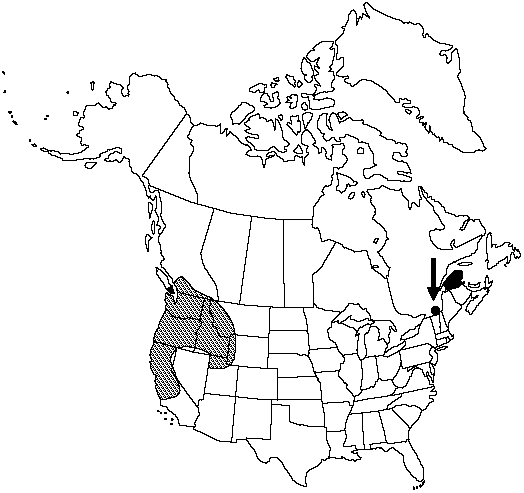Difference between revisions of "Aspidotis densa"
Amer. Fern J. 58: 141. 1968.
Common names: Indian's dream aspidote touffue
Endemic
Basionym: Onychium densum Brackenridge in Wilkes, U.S. Expl. Exped. 16: 120, plate 13, fig. 2. 1854, 1855
Synonyms: Cheilanthes siliquosa Maxon Pellaea densa (Brackenridge) Hooker
Treatment appears in FNA Volume 2.
FNA>Volume Importer |
imported>Volume Importer |
||
| (One intermediate revision by the same user not shown) | |||
| Line 8: | Line 8: | ||
}} | }} | ||
|common_names=Indian's dream;aspidote touffue | |common_names=Indian's dream;aspidote touffue | ||
| + | |special_status={{Treatment/ID/Special_status | ||
| + | |code=E | ||
| + | |label=Endemic | ||
| + | }} | ||
|basionyms={{Treatment/ID/Basionym | |basionyms={{Treatment/ID/Basionym | ||
|name=Onychium densum | |name=Onychium densum | ||
| Line 57: | Line 61: | ||
|publication title=Amer. Fern J. | |publication title=Amer. Fern J. | ||
|publication year=1968 | |publication year=1968 | ||
| − | |special status= | + | |special status=Endemic |
| − | |source xml=https:// | + | |source xml=https://bitbucket.org/aafc-mbb/fna-data-curation/src/2e0870ddd59836b60bcf96646a41e87ea5a5943a/coarse_grained_fna_xml/V2/V2_244.xml |
|genus=Aspidotis | |genus=Aspidotis | ||
|species=Aspidotis densa | |species=Aspidotis densa | ||
Latest revision as of 20:22, 5 November 2020
Leaves monomorphic or often somewhat dimorphic, 8–25 cm; fertile leaves more erect than sterile leaves, long-petioled, petioles often 2–5 times longer than blades, fertile blades with more ascending pinnae and narrower segments than sterile blades. Blade 3–4-pinnate, 2–10 cm, somewhat leathery. Ultimate segments linear, 3–8 mm; midrib prominent abaxially. Sori of mature blades continuous along length of segments except at apex; indusia linear, margins with 10–35, shallow, regular teeth or erose. 2n = 60.
Habitat: Slopes, crevices, rocky outcrops, often on serpentine, sometimes in chaparral
Elevation: 300–3400 m
Distribution

B.C., Que., Calif., Idaho, Mont., Nev., Oreg., Utah, Wash., Wyo.
Discussion
Selected References
None.
Lower Taxa
None.